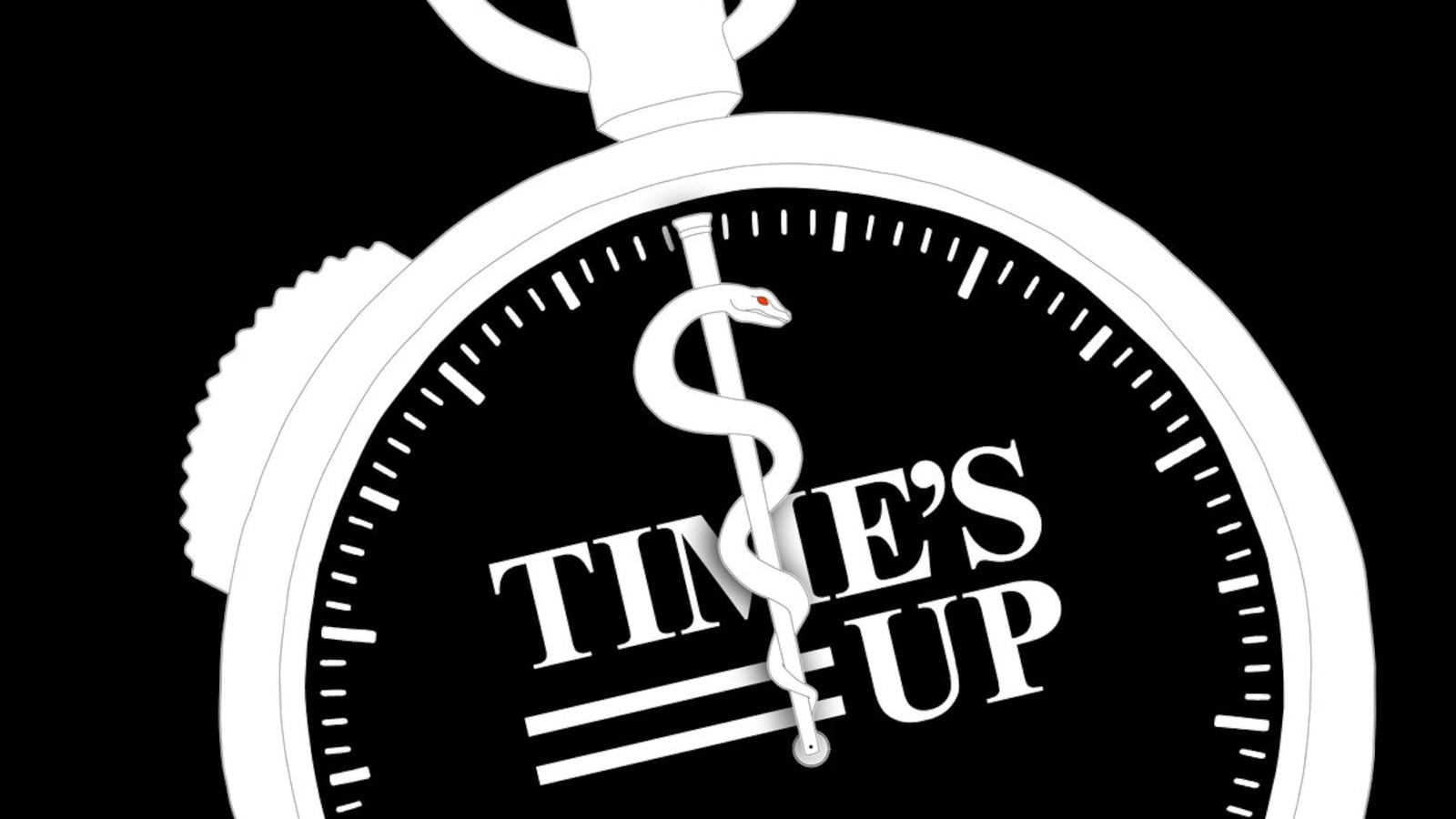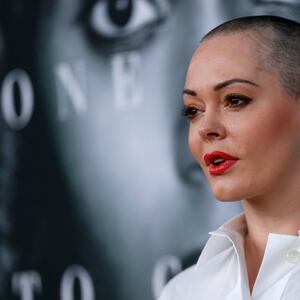Late last month, the founding members of Time’s Up Healthcare held a meeting to discuss what, exactly, they were doing. The group—an offshoot of the glitzy nonprofit founded to combat sexism in Hollywood—had been largely inactive for over a year, hosting only a handful of meetings and sunsetting multiple promising projects. As the pandemic raged, and members felt less and less supported, founders had begun writing in to complain about the lack of action.
The members at the Feb. 24 meeting were thrilled to see each other, and leadership tried to put a positive spin on things, highlighting multiple initiatives the larger Time’s Up group had been working on. What they did not mention was that two days later, a lawsuit would be filed—and quickly made public—accusing one of the organization's most prominent members of brushing off an allegation of sexual misconduct. Within weeks, more than a dozen of the group’s 50 founding members would be gone and the organization's future would be in question.
Interviews with seven of the group’s founding members, as well as internal communications reviewed by The Daily Beast, paint a picture of how the allegations rocked the foundations of one of the MeToo era's most promising women’s rights groups.
Time’s Up Healthcare launched in March of 2019, with a sparkling soiree at the historic New York Academy of Medicine. More than 150 of the nation’s top medical professionals and their supporters swapped scrubs for evening wear and sipped cocktails with other nationally renowned experts on sexism in medicine. Among the speakers were Fatima Goss Graves, president of the National Women’s Law Center, and Esther Choo, an emergency medicine doctor from Oregon who kicked off the evening by emphatically declaring that “time is up in health care.”
The issue the group meant to address is a serious one: About half of all female physicians and a quarter of nurses say they have been sexually harassed at work. According to a report from the National Academies of Sciences, Engineering, and Medicine, sexual harassment is almost twice as prevalent in academic medicine than the other sciences. And while the industry is majority female—women make up three-quarters of all health-care workers and more than half of all medical school entrants—just 15 percent of department chairs and 16 percent of deans are women.
The organization’s launch sparked laudatory coverage in glossy magazines like InStyle, which touted its ties to major women’s medical groups and health-care unions. The group even landed a partnership with trendy scrubs brand Figs, which allowed customers to affix a Time’s Up Healthcare logo to their outfits and donate the proceeds to the Legal Defense Fund. (The company also rolled out Time’s Up Healthcare-branded compression socks.)
But less than a year in, the cracks in the facade were starting to show. The founding members initially held monthly meetings to discuss strategy; in 2020, the number of full-group meetings could be counted on one hand. Several initiatives—such as campaigns for more diversity on medical journal editorial boards and a code of conduct at medical conferences—were put on indefinite pause.
The group was one of the few Time’s Up offshoots to hire its own executive director, but simultaneously lost much of its independence: At the end of 2019, around the same time Lauren Powell was hired as executive director, the organization’s free-standing web page was removed and replaced with a page on the larger Time’s Up Now site. Last spring, the group “archived” their Twitter account, rerouting all posts related to healthcare to the larger Time’s Up Now account.
At the same time, the stars of the group’s most prominent members continued to rise. Choo, the physician who spoke at the launch event, took the helm of the group before Powell’s hire and quickly started representing it at conferences and events. According to her website, Choo gave four speeches on behalf of the organization in 2019—including at the Mayo Clinic and the Yale School of Medicine—and represented the group on a panel at the swanky Aspen Ideas Festival. Her already sizable Twitter following tripled, and she began speaking regularly on CNN and MSNBC.
“Esther Choo—ER doc, social media force, and mobile hospital unit innovator—has become the spokesperson for an entire medical community during a global pandemic,” one Portland Monthly profile gushed.

Esther Choo speaks on stage during the Conde Nast session at the Cannes Lions 2019.
Richard Bord/GettyTwo weeks ago, Choo’s name landed in the press for another reason: An employee at the local Veteran’s Affairs hospital filed an explosive lawsuit accusing medical resident and TikTok star Jason Campbell of sexual harassment—and listing Choo as one of several Oregon Health and Sciences University officials who brushed off her complaints.
The plaintiff, who is anonymous in the suit, claims the former OHSU resident harassed her for months, sending her photos of his erection and Instagram messages saying, “you look tasty.” Campbell occasionally worked at the VA hospital and had a pass to enter the premises, and on one occasion, allegedly snuck up behind the victim at work and pressed his erection into her backside. “I just want to hug you from behind without you yelling at me,” he allegedly texted her later.
Campbell did not respond to multiple requests for comments and has not responded to the accusations publicly or in court filings.
The plaintiff claims she reported Campbell’s harassment to Choo in writing last March. Instead of reporting the behavior to her superiors, the complaint claims, Choo responded by text: “Ugh, I’m giving him feedback.” When the plaintiff contacted Choo about another woman who had allegedly been harassed by Campbell and feared coming forward, she claims Choo responded: “It’s never worth it. Never.” Later, Choo tagged Campbell in a tweet about doctors with “big followings and big hearts” and posed with him in a picture.
The complaint also accuses Laura Stadum, a fellow Time’s Up Healthcare founding member and Title IX coordinator at OHSU, of “victim shaming, ignor[ing] evidence and fail[ing] to follow up on evidence” in a prior sexual harassment investigation in which the plaintiff was involved.
OHSU said in a statement to local news station KGW that it received a report of sexual harassment on April 17 and removed Campbell from his clinical duties soon after. He was dismissed in October after an internal investigation found he had violated the hospital’s code of conduct. In court filings, the hospital claims Choo initially offered to meet with Campbell, but encouraged the victim to report him after learning more about her allegations. It claims Stadum “promptly, thoroughly and fairly investigated all complaints of sexual harassment.”
In a statement to The Daily Beast last week, a spokesperson for Choo said that if the litigation moved forward, “documentary evidence will be presented that will paint a picture of Esther’s conduct that is completely different from what has been reported in the press.”
“Throughout her life, Dr. Esther Choo has fought for protecting and supporting the voices of survivors, and she has fought for those values in the healthcare industry for many years,” the spokesperson said. “When [the plaintiff], who at the time was a friend, approached her, Esther acted in a way that was 100 percent consistent with those values, offering to do everything that she could to support her friend, while at the same time respecting her friend’s own agency in making decisions about what to do.”
The case was a grenade thrown at the credibility of Time’s Up Healthcare leadership, but founding members say they received no warning from the organization. Instead they learned about it from friends, family, and outraged commenters on Twitter.
“Where’s @TIMESUPHC and @TIMESUPNOW when it ACTUALLY matters?” gynecologist Staci Tanouye tweeted March 1, after news of the lawsuit broke.
“The silence speaks volumes,” added Chicago-based internist Monica Maalouf.
Jonas Attilus, an internal medicine resident and co-host of the Social Medicine on Air podcast, tweeted that both he and Campbell had appeared in a Time’s Up Healthcare video years ago.
“Today, I see betrayal & wrongness when #Medtwitter is so quiet,” he wrote. “Fame and/or money can't be a pass to abusers. Where are #HeForShe & @TIMESUPHC?”
Several days later, after multiple members reached out seeking guidance on how to respond—and a few even tweeted their own displeasure—Time’s Up Chief Operating Officer Monifa Bandele organized an emergency meeting for the founders. But when attendees showed up to the virtual gathering, they were surprised to see Choo there, along with Time’s Up CEO Tina Tchen and board chair Roberta Kaplan—the famed women’s rights attorney who recently made headlines for suing Donald Trump on behalf of E. Jean Carroll.
Multiple participants said Kaplan claimed she was “representing” Choo, and acted as Choo’s attorney would, batting away suggestions that she step away from the organization until the lawsuit was resolved. (Kaplan later confirmed to Vice that she was indeed representing Choo, “because she’s my friend.”) At one point, founding member Dr. Kali Cyrus recalled, Kaplan referred to Time’s Up Healthcare as a “sisterhood,” and suggested its members should defend their sisters.
Tchen, Kaplan’s business partner in an anti-sexual-harassment advisory firm, also defended Choo, telling attendees that if everyone who was accused of something sinister stepped down from the organization “we wouldn’t have anyone left,” according to multiple people present.
When members complained about the group’s proposed statement, which offered support for the survivor while emphasizing that Choo was not a defendant in the case, the leadership promised to take their feedback into consideration. But attendees said Tchen also refused to release the statement from the larger Time’s Up Twitter account, saying the account was “too hot” from their recent Golden Globes campaign.
Multiple attendees told The Daily Beast they left the call feeling railroaded, their suggestions on how to handle the situation overrun by the desires of Time’s Up leadership.
"I think what was clear at the end of the call was that that call was not really for us,” Cyrus said. “They were not going to change if we weren't in line with them.”
“I left thinking, ‘What was the purpose of this call if you didn't actually take our input?’” she added.
The next day, according to communications reviewed by The Daily Beast, founders organized a separate meeting to discuss a path forward “with all options on the table and an opportunity to speak freely about them." Nearly half of the founding members attended, and later sent the steering committee a list of proposed next steps, including talking to Choo about stepping back from her position and releasing a different statement that would more clearly articulate their concern for survivors. They specifically noted the sense of urgency they felt in addressing the issue publicly.
Time’s Up leadership responded by saying they would discuss the suggestions and get back to the group at some unspecified date. Later that day, they posted a statement largely unchanged from the original version.
Time’s Up declined to comment for this story. But this week, Tchen posted an open letter addressing the defections and her decision to stand by Choo.
“Perhaps the easy thing to do when difficult cases arise is to walk away from anyone who has had anything to do with a troubled institution or a difficult set of facts,” she wrote. “But to do so is to walk away from the very people inside troubled institutions who are doing the hard work of confronting power and standing with survivors even in complicated and challenging situations. It will ultimately weaken our movement’s ability to realize the change we seek.”
Time’s Up has weathered many criticisms since it launched in January 2018 as Hollywood's official response to the MeToo movement: it was too beholden to Hollywood power brokers, it ignored survivors with less clout, it was little more than a feel-good social media campaign.
Some hit harder than others. In 2019, former CEO Lisa Borders stepped down after her son was accused of sexually harassing a woman during a “healing session” at her apartment. Tchen, her replacement, was forced to go on the record with The New York Times a year later, after it was revealed that the organization had refused to provide funding to a woman who accused Joe Biden of sexual assault.
The organization came under fire again last year after it refused to sign onto a letter supporting On the Record, a controversial documentary about sexual abuse allegations against Russell Simmons. At the time, The Hollywood Reporter spoke to more than two dozen survivors, executives, and Time's Up donors, who expressed sentiments about the group ranging from “cautious support to growing skepticism to downright hostility.”
But so far, no criticisms have landed as heavily as those leveled at Time’s Up Healthcare. Last Thursday, after the organization published its initial statement about the OHSU suit, founding members began announcing their resignations en masse on Twitter. Almost a dozen founding members have publicly stepped down (others have done so privately) and two prominent partner organizations have quietly pulled their names from the Time’s Up website.
Every founding member who spoke with The Daily Beast said they quit not because of what was alleged in the lawsuit, but because of how the organization handled it. They resented Time’s Up’s failure to tell them about the suit and its refusal to take their feedback into account. There was an overwhelming feeling of hypocrisy, that an organization built on demanding institutional accountability was now using its institutional power to fight for one of its own.
As one former member told The Daily Beast, the founding members “would fight to salvage the organization if we felt like it was something worth saving.” But at the end of the day, the resigning members were left asking themselves what, exactly, there was to save.
“One of the questions that really came up was, ‘Does Time’s Up Healthcare even exist anymore?’” said Dr. Lynn Fiellin, a professor at the Yale School of Medicine. “Because if it’s not there, if we’ve kind of been stripped of any position and yet we’re being represented with a voice that’s not ours—all of it felt wrong.”
“We’re a group of like-minded, committed individuals that I think really came to an impasse with the bigger organization on how things should be handled,” she added. “And for me personally, I just couldn't be a part of that.”
For Cyrus—a Black queer woman—the handling of the issue cut deeper, toward the allegations of elitism and exclusion leveled at Time’s Up as a whole.
The moment she heard Kaplan start talking about “sisterhood,” she said, “I was like, ‘'I’m done here.’”
“Because I'm not in the sisterhood. They’re not going to protect me. They’re protecting the people who are in their inner circle.”
“I feel like that sisterhood is for high-profile people,” she added, “and I’m not one of them.”



